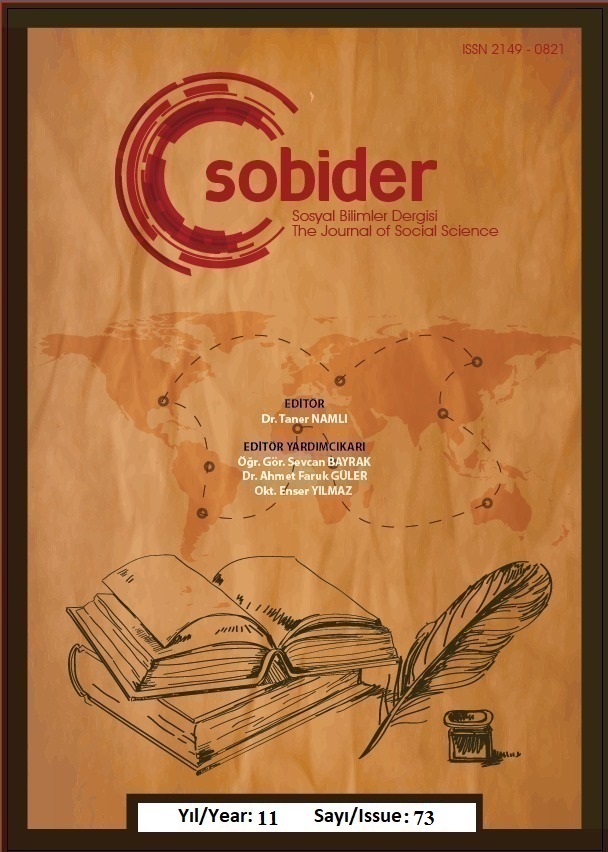TÜRKÇE ÖĞRETİMİNDE EVRENSEL TASARIMA DAYALI ÖĞRENME’NİN ORTAOKUL ÖĞRENCİLERİNİN OKUDUĞUNU VE DİNLEDİĞİNİ ANLAMA BECERİLERİNE ETKİSİNİN İNCELENMESİ
Author :
Abstract
Bu araştırmanın amacı Türkçe öğretiminde Evrensel Tasarıma Dayalı Öğrenme’nin 6.sınıf öğrencilerinin okuduğunu anlama ve dinlediğini anlama becerilerine etkisini incelemektir. Araştırma, iç içe karma desende yürütülmüştür. Araştırmanın çalışma grubunu Millî Eğitim Bakanlığına bağlı bir ortaokulun 2 şubesinde öğrenim gören 6. sınıf öğrencileri oluşturmaktadır. Çalışmanın nicel verileri “Okuduğunu Anlama Becerisi Bilgi Testi” ve “Dinlediğini Anlama Becerisi Bilgi Testi” ile elde edilmiştir. Nitel verileri ise “Evrensel Tasarıma Dayalı Öğrenme’ye ilişkin görüşme formu” ile elde edilmiştir. Araştırmada deney grubu ile yapılan derslerde Evrensel Tasarıma Dayalı Öğrenme çerçevesinden hareketle oluşturulmuş dersler işlenmişken, kontrol grubu ile yapılan derslerde mevcut öğretim programının öngördüğü şekilde işlenmiştir. Deney ve kontrol grubu öğrencilerin okuduğunu anlama ve dinlediğini anlama son test puanları arasında anlamlı farklılık olup olmadığını belirlemek için İlişkisiz Örneklemler İçin T Testi kullanılmıştır. Evrensel Tasarıma Dayalı Öğrenme’ye ilişkin görüşme formundan elde edilen nitel veriler, içerik analizine göre analiz edilmiştir. Araştırmanın nicel verilerinin analizi sonucunda öğrencilerin okuduğunu anlama becerileri düzeyleri deney grubu lehine anlamlı farklılık gösterdiği belirlenmişken dinlediğini anlama becerileri düzeyleri açısından deney ve kontrol grubu öğrencileri arasında anlamlı farklılık belirlenmemiştir. Araştırmanın nitel verilerinin analizi sonucunda Evrensel Tasarıma Dayalı Öğrenme ortamının oluşturulduğu deney grubunda öğrencilerin okuma stratejilerini kullandıkları, metne odaklandıkları ve okumaya yönelik olumlu tutum geliştirdikleri; dinlediklerine odaklandıkları ve dinleme stratejilerini kullandıkları belirlenmiştir.
Keywords
Abstract
The aim of this study is to examine the effect of Universal Design for Learning in Turkish language teaching on 6th grade students' reading comprehension and listening comprehension skills. The research was conducted in a embedded mixed design. The study group of the research consists of 6th grade students studying in 2 branches of a secondary school affiliated to the Ministry of National Education. The quantitative data of the study were obtained with "Reading Comprehension Knowledge Test", "Listening Comprehension Knowledge Test". Qualitative data were obtained with the "Interview form on Universal Design for Learning". In the study, the lessons with the experimental group were based on the Universal Design for Learning framework, while the lessons with the control group were taught in accordance with the current curriculum. Independent Samples T Test was used to determine whether there was a significant difference between the reading comprehension and listening comprehension post-test scores of the experimental and control group students. The qualitative data obtained from the interview form related to Universal Design for Learning were analysed according to content analysis. As a result of the analysis of the quantitative data of the study, that there was a significant difference in favour of the experimental group in terms of students' reading comprehension skills, there was no significant difference between the experimental and control group students in terms of listening comprehension skills. As a result of the analysis of the qualitative data of the study, regarding their contribution to reading comprehension skills, it was concluded that they used reading strategies, focused on the text and developed positive attitudes towards reading. Regarding the contribution to listening comprehension skills, it was determined that they focused on what they listened and used listening strategies.





